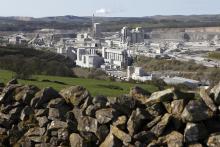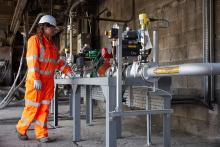
Supported by Department for Business, Energy and Industrial Strategy (BEIS) funding, the trial at Hanson Cement’s Ribblesdale plant in Lancashire used a mix of 100% net zero fuels including hydrogen for commercial scale cement manufacture for the very first time.
During the demonstration at the Ribblesdale plant – a culmination of several years of work – the proportion of fuels in the cement kiln’s main burner was gradually increased to a wholly net zero mix.
The mix consisted of tanker delivered hydrogen as well as meat and bone meal (MBM) and glycerine – by-products from the rendering and biodiesel industries respectively – demonstrating the pathway to moving away from using fossil fuels in cement and concrete production.
If fully implemented for the whole kiln system the partners say nearly 180,000 tonnes of carbon dioxide could be saved each year at Ribblesdale alone compared to using the traditional fuel of coal at the site.
Amother demonstration project to use plasma energy with biofuel in the kiln’s calciner is taking place at a site in Derbyshire operated by Tarmac, alongside a further trial exploring the use of hydrogen as an alternative to natural gas for lime manufacturing.
The MPA says it will share results from all projects with cement producers and other energy-intensive industries both in the UK and globally as best practice examples, with the aim of spreading and maximising the environmental benefits of the technology.









